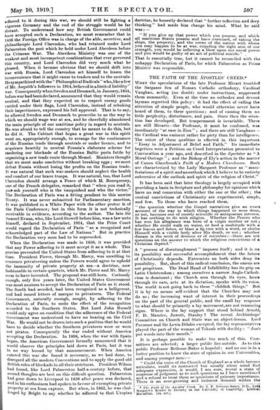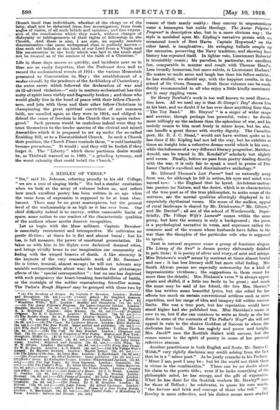THE FAITH OF THE APOSTLES' CREED.* Wass the speculations of
the late Professor Mired troubled the Sargasso Sea of Roman Catholic orthodoxy, Cardinal Vaughan, acting (no doubt) under instructions, suppressed them summarily. Even at the time an orthodox and devout layman regretted this policy : it had the effect of calling the attention of simple people, who would otherwise never have heard of them, to these questions ; and of causing them no little perplexity, disturbance, and pain. Since then the situa- tion has developed. But temperament is invariable. There are still Mivarts—the Professor, it must be confessed, war inordinately "at ease in Zion " ; and there are still Vaughans — the Cardinal was eminent rather for piety than for intelligence. The union of these qualities is effected in this important " Essay in Adjustment of Belief and Faith." Its immediate begetters were a Petition on Creed Interpretation presented to Convocation a year ago, and described in the Spectator as "A Moral Outrage " ; and the Bishop of Ely's action in the matter of Canon Glazebrook's Faith of a Modern Churchman. Both are characterized by the Lady Margaret Professor as " mani- festations of a spirit and an outlook which I believe to be entirely subversive of the outlook and spirit of the religion of Christ."
It has been said that later theology is largely occupied with providing a basis in Scripture and philosophy for opinions which have no real connexion with either the one or the other ; the central convictions of Christianity are experimental, simple, and few. To those who have reached them,
"the question whether the Gospel narratives give an exact account of the way in which things happened or wore done, or not, becomes one of merely scientific or antiquarian interest.. It has nothing to do with religion. Whether the Person who has won his allegiance was born of a virgin mother or not ; whether He could walk on water, or feed a multitude with a few loaves and fishes, or blast a fig-tree with a word, or clothe Himself with a visible body after His death, or not ; whether disease is the work of demons or of microbes r—these are not questions on the answer to which the religious convictions of a Christian depend."
A "process of disentanglement" imposes itself ; and it is on its possibility and successful accomplishment that the future of Christianity depends. Extremists on both sides deny its possibility. But, short of this radical conclusion, the omens are not propitious. The Dead Hand of Infallibility has its grip on Latin Christendom ; among ourselves a narrow Anglo-Catholi- cism is dominant ; the Church sees through its eyes, hears through its ears, acts at its dictation, speaks with its voice_ The world is not going back to these " childish things." But it is by no means self-evident that the Churches may not do so ; the increasing want of interest in their proceedings on the part of the general public, and the small lay response to what should be primarily a lay movement, are not reassuring signs. Where is the lay support that stood behind Arnold, F. D. Maurice, Jowett, Stanley ? The recent Archbishops Committee on Church and State was an object-lesson. Lord Parmoor and Sir Lewis Dibdin excepted, the lay representatives played the part of the woman of Tekoah with docility : " Josh put words into their mouth."
It is perhaps possible to make too much of this. Com- mittees arc selected; a larger public lies outside. As to this public Professor Bethune-Baker is hopeful : and no one is in a better position to know the state of opinion in our Universities, and among younger men :—
" Could the voice of the Church of England as a whole become articulate, could its instructed but usually silent mind find adequate expression, it would, I am sure, reveal a state of suspense of judgment as to such questions as I have mentioned and a refusal to treat them as questions of primary importance. There is an ever-growing and insistent demand within the
• The Fay!, of lee Araks' Creed. Sty J. pialletirzo-Btsre D.116Iadg. Margaret'. Reuter lo Divinity in the tc am ge. dos. Macmillan. 1.5a get.1 Church itself that Individuals, whether of the clergy or of the laity, shall not be debarred from free investigation, from fresh angles of vision, of all such belief. and opinions, and free expres- sion of the conclusions which they reach, without charges of disloyalty or infringements of their rights of fellowship in the Church. And there is also, I am sure, an equally resolute determination—far more widespread than is publicly known— that such old beliefs as the birth of our Lord from a Virgin and Him resurrection in the body which was laid in the tomb shall not be treated as of the essence of the faith of a Christian."
Life in these days moves so quickly, and incidents near us in time are so easily forgotten, that the Professor does well to record the ecclesiastical events of 1914: the various Memorials presented to Convocation in, May ; the establishment of a modes vivendi , by the prudence of the Archbishop of Canterbury ; the anion sacree which followed the declaration of war and its ill-advised violation—" only in matters ecclesiastical has this unity of spirit been visibly and flagrantly broken ; and those who would gladly live in the bond of peace with their fellow-Church- men, and join with them and their other fellow-Christians in championing the great spiritual conviction of our common faith, are assailed again as they were in 1914, and obliged to defend the cause of freedom in the Church that is again endan- gered." Such persons would be credulous indeed were they to trust themselves to the tender mercies of the clerical and mixed Assemblies which it is proposed to set up under the so-called Enabling Bill, or to a Disestablished Church. In such a Church their position, the Church Times reminds them, "would instantly become precarious." It would ; and they will be foolish if they forget it. The " Liberty " which these partisans desire would be, as Thirlwall warned us in 1869, " a grinding tyranny, and the worst calamity that could befall the Church."







































 Previous page
Previous page